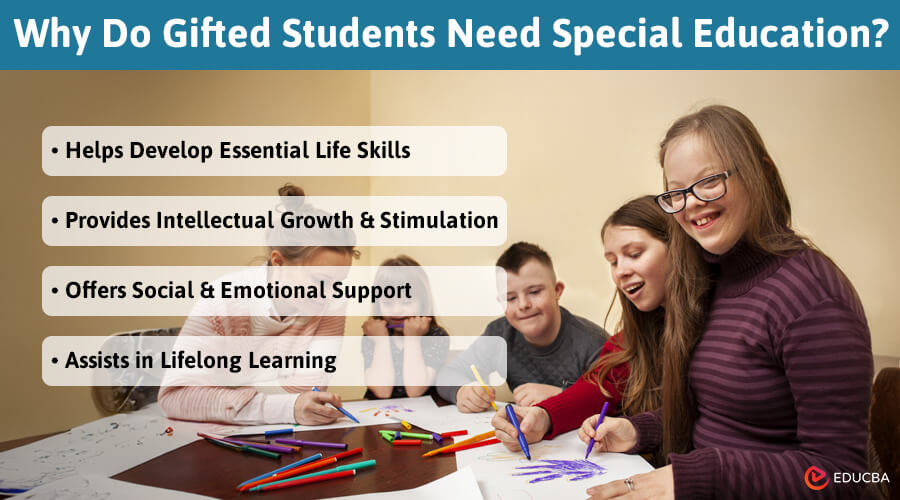
Why Do Gifted Students Need Special Education? – Introduction
Gifted students possess unique academic and intellectual abilities that set them apart from their peers. These students often demonstrate an advanced understanding of complex concepts, heightened problem-solving skills, and a natural curiosity that drives them to explore subjects in greater depth. While these characteristics are undoubtedly beneficial, they also present a set of challenges, which is why gifted students need special education.
Standard classrooms meet the needs of the average student but may not provide the appropriate level of stimulation for gifted students. Without tailored educational programs, these students risk becoming disengaged, under-stimulated, and, in some cases, underachieving. It shows how important it is to recognize and nurture their talents through dedicated support systems.
Identifying Gifted Students Through Comprehensive Assessment
Accurately identifying gifted students is the first step in providing them with the support they need. Traditional methods of assessment, such as standardized testing, may not always capture the full extent of a student’s abilities. It is where exams for the gifted and talented come into play. These specialized assessments evaluate a broader range of cognitive and creative abilities, offering a more holistic view of a student’s potential.
Unlike general standardized tests, which primarily measure knowledge acquisition, these specialized assessments focus on critical thinking, problem-solving, and creativity. These exams help educators identify students who might excel in specific areas, such as mathematics, science, or the arts, even if their overall academic performance appears average. By using these gifted and talented exams, schools can ensure that no gifted student goes unnoticed, paving the way for appropriate educational interventions.
Benefits of Specialized Programs in Enhancing Learning
According to an article published by UNSW Sydney Newsroom, neglecting gifted students in education can be costly for Australians, contrasting the need to provide support for gifted students. Specialized educational programs cater to the advanced learning needs of gifted students. These programs go beyond the traditional curriculum, offering a more challenging and enriched educational experience.
The benefits of such programs are as follows:
1. Helps Develop Essential Life Skills
Tailored support helps gifted students develop essential life skills, such as resilience, adaptability, and self-discipline. These skills help them succeed in both personal and professional settings. By fostering these attributes early on, schools can equip gifted students with the tools they need to navigate the complexities of adult life, consequently making meaningful contributions to society.
2. Provides Intellectual Growth and Stimulation
Specialized programs encourage intellectual growth by providing an environment where gifted students can engage with complex and stimulating content. It allows them to work at a pace that matches their capabilities, thereby preventing boredom and frustration. Moreover, these programs often incorporate interdisciplinary approaches, enabling students to apply their knowledge across various subjects, further enhancing their critical thinking and problem-solving skills.
3. Offers Social and Emotional Support
Specialized support can address the social and emotional needs of gifted students. These students often experience a sense of isolation in regular classrooms, as their peers may not share their interests or abilities. By participating in programs tailored for gifted individuals, they can connect with like-minded students, fostering a sense of belonging and collaboration. It is particularly important during the formative years when social development plays a crucial role in overall well-being.
4. Assists in Lifelong Learning
The benefits of providing specialized educational support to gifted students extend far beyond their school years. When gifted students receive the appropriate challenges and encouragement, they are more likely to develop a lifelong love of learning. This intrinsic motivation often leads to higher academic achievement, increased confidence, and a greater likelihood of pursuing advanced studies or careers in their areas of interest.
Final Thoughts
Providing specialized educational support for gifted students is not merely a matter of academic enrichment; it ensures their overall development and well-being. Standard classrooms, while effective for the majority of students, do not always meet the needs of those with exceptional abilities. By implementing tailored programs and utilizing comprehensive assessments, schools can create an environment where gifted students can thrive. This investment in specialized support will not only benefit the students themselves but also contribute to the broader educational community by fostering a culture of excellence and innovation.
Recommended Articles
We hope you found the answer to why gifted students need special education. Check out these recommendations to learn more.
